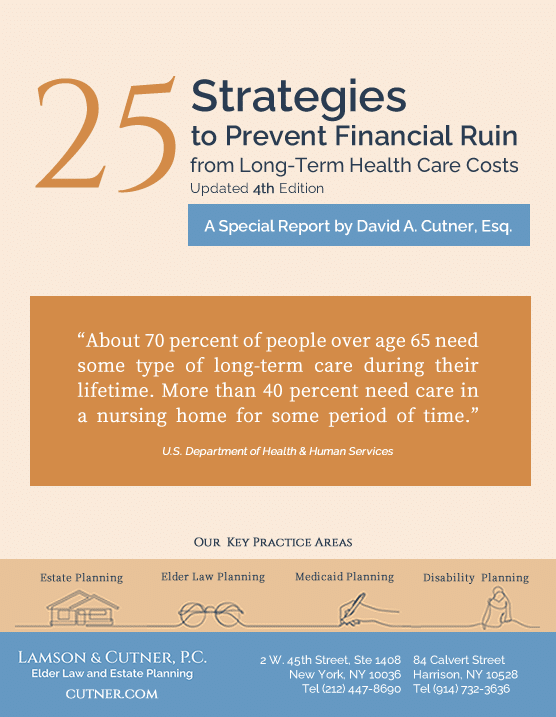This is Strategy #2 from Lamson & Cutner’s publication, “25 Strategies to Prevent Financial Ruin from Long-Term Health Care Costs.” Click here to see the other strategies.
The thought of aging and potentially becoming sick can be frightening. Most of us hope for the best, but fail to plan for the worst. Who wants to think about the prospect of suffering from a medical condition that sets off a prolonged decline physically, emotionally and financially, or that might strike a loved one? So instead of preparing for potential problems in the future, most people delay or take no action at all. Unfortunately, this “wait and see” approach can lead to disastrous consequences.
Be aware of what can happen without good planning. If you require long-term care, and you have money, income, property or other economic resources in your name, Medicaid will insist you use them up before it pays any benefits. This is what is referred to as the “spend down.” If you own your home, in most cases Medicaid will not count it toward the value of your assets when determining your eligibility – but Medicaid may be entitled to enforce a lien against it after you move out, equal to the amount of the benefits it provided. The end result is already predetermined: you’ll eventually exhaust your own resources, including the equity you have built up in your home, and find yourself in poverty.
Here’s an example of what can be accomplished, in a case Lamson & Cutner handled for an elderly couple with a significant net worth. Their assets and financial reserves were significant, and the husband, who was approaching 90 years of age, needed nursing home care. We arranged for the transfer of his money and property to his wife. We then filed a Medicaid application for nursing home benefits. The planning steps we’d first taken allowed our client to qualify, and he was approved.
The outcome is that his nursing home care is now fully paid for by Medicaid, his wife’s financial needs are satisfied, and the cash and holdings they’d invested a lifetime of effort in building could, with additional planning, be secured. We then did estate planning for his wife, and took steps to help protect the assets in her possession. These steps place her in the strongest possible financial position, regardless of what the future may bring in terms of her own medical and health needs. (In most cases involving married couples, further planning should be done to protect the assets in the hands of the well spouse to the extent possible, as that spouse may subsequently be subject to a reimbursement claim by Medicaid.)
This couple won’t lose all they’d worked for due to ruinous health care expenses, and they won’t leave the well spouse in a precarious financial position should she need long-term care down the road. The well spouse also has the financial resources to make her husband’s stay at the nursing home as pleasant as possible.
visit our key practice areas


